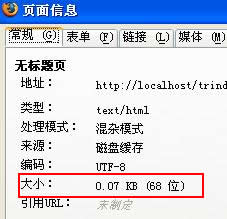 Backend Development
Backend Development
 PHP Tutorial
PHP Tutorial
 PHP method to implement web page compression function based on ob_start(ob_gzhandler)
PHP method to implement web page compression function based on ob_start(ob_gzhandler)
PHP method to implement web page compression function based on ob_start(ob_gzhandler)
This article mainly introduces how PHP implements web page compression function based on ob_start('ob_gzhandler'), involving ob_gzip, ob_start and other functions in PHP to operate the buffer and content compression related techniques. Friends in need can refer to the following
The example in this article describes how PHP implements web page compression function based on ob_start('ob_gzhandler'). Share it with everyone for your reference, the details are as follows:
PHP generates a web page and sends it to the browser for display. In addition to the user's Internet speed, the opening speed of the page is often closely related to the size of the page. We can Start with web page size to improve web page responsiveness.
The following code is an example of compressing a web page. We use the ob_gzip function and ob_start to compress the output content and put it into the "buffer" before outputting it.
PHP code
//启用压缩
if(function_exists('ob_gzip'))
{
ob_start('ob_gzip');
}
//准备一些待压缩的内容
for($i=0; $i<100; $i++)
{
echo('这里是测试内容 <br>');
}
//输出压缩成果
ob_end_flush();
//这是ob_gzip压缩函数
function ob_gzip ($content)
{
if( !headers_sent() && extension_loaded ("zlib") && strstr ( $_SERVER["HTTP_ACCEPT_ENCODING"], "gzip")){
$content = gzencode($content,9);
header ("Content- Encoding: gzip");
header ("Vary: Accept- Encoding");
header ("Content- Length: ".strlen ($content));
}
return ($content) ;
}How effective is it? Here I tested the above code.
Before compression:

After compression:

More php based on ob_start(ob_gzhandler) For related articles on how to implement web page compression function, please pay attention to the PHP Chinese website!

Hot AI Tools

Undresser.AI Undress
AI-powered app for creating realistic nude photos

AI Clothes Remover
Online AI tool for removing clothes from photos.

Undress AI Tool
Undress images for free

Clothoff.io
AI clothes remover

AI Hentai Generator
Generate AI Hentai for free.

Hot Article

Hot Tools

Notepad++7.3.1
Easy-to-use and free code editor

SublimeText3 Chinese version
Chinese version, very easy to use

Zend Studio 13.0.1
Powerful PHP integrated development environment

Dreamweaver CS6
Visual web development tools

SublimeText3 Mac version
God-level code editing software (SublimeText3)

Hot Topics
 Working with Flash Session Data in Laravel
Mar 12, 2025 pm 05:08 PM
Working with Flash Session Data in Laravel
Mar 12, 2025 pm 05:08 PM
Laravel simplifies handling temporary session data using its intuitive flash methods. This is perfect for displaying brief messages, alerts, or notifications within your application. Data persists only for the subsequent request by default: $request-
 Build a React App With a Laravel Back End: Part 2, React
Mar 04, 2025 am 09:33 AM
Build a React App With a Laravel Back End: Part 2, React
Mar 04, 2025 am 09:33 AM
This is the second and final part of the series on building a React application with a Laravel back-end. In the first part of the series, we created a RESTful API using Laravel for a basic product-listing application. In this tutorial, we will be dev
 cURL in PHP: How to Use the PHP cURL Extension in REST APIs
Mar 14, 2025 am 11:42 AM
cURL in PHP: How to Use the PHP cURL Extension in REST APIs
Mar 14, 2025 am 11:42 AM
The PHP Client URL (cURL) extension is a powerful tool for developers, enabling seamless interaction with remote servers and REST APIs. By leveraging libcurl, a well-respected multi-protocol file transfer library, PHP cURL facilitates efficient execution of various network protocols, including HTTP, HTTPS, and FTP. This extension offers granular control over HTTP requests, supports multiple concurrent operations, and provides built-in security features.
 Simplified HTTP Response Mocking in Laravel Tests
Mar 12, 2025 pm 05:09 PM
Simplified HTTP Response Mocking in Laravel Tests
Mar 12, 2025 pm 05:09 PM
Laravel provides concise HTTP response simulation syntax, simplifying HTTP interaction testing. This approach significantly reduces code redundancy while making your test simulation more intuitive. The basic implementation provides a variety of response type shortcuts: use Illuminate\Support\Facades\Http; Http::fake([ 'google.com' => 'Hello World', 'github.com' => ['foo' => 'bar'], 'forge.laravel.com' =>
 12 Best PHP Chat Scripts on CodeCanyon
Mar 13, 2025 pm 12:08 PM
12 Best PHP Chat Scripts on CodeCanyon
Mar 13, 2025 pm 12:08 PM
Do you want to provide real-time, instant solutions to your customers' most pressing problems? Live chat lets you have real-time conversations with customers and resolve their problems instantly. It allows you to provide faster service to your custom
 Notifications in Laravel
Mar 04, 2025 am 09:22 AM
Notifications in Laravel
Mar 04, 2025 am 09:22 AM
In this article, we're going to explore the notification system in the Laravel web framework. The notification system in Laravel allows you to send notifications to users over different channels. Today, we'll discuss how you can send notifications ov
 Explain the concept of late static binding in PHP.
Mar 21, 2025 pm 01:33 PM
Explain the concept of late static binding in PHP.
Mar 21, 2025 pm 01:33 PM
Article discusses late static binding (LSB) in PHP, introduced in PHP 5.3, allowing runtime resolution of static method calls for more flexible inheritance.Main issue: LSB vs. traditional polymorphism; LSB's practical applications and potential perfo
 PHP Logging: Best Practices for PHP Log Analysis
Mar 10, 2025 pm 02:32 PM
PHP Logging: Best Practices for PHP Log Analysis
Mar 10, 2025 pm 02:32 PM
PHP logging is essential for monitoring and debugging web applications, as well as capturing critical events, errors, and runtime behavior. It provides valuable insights into system performance, helps identify issues, and supports faster troubleshoot





